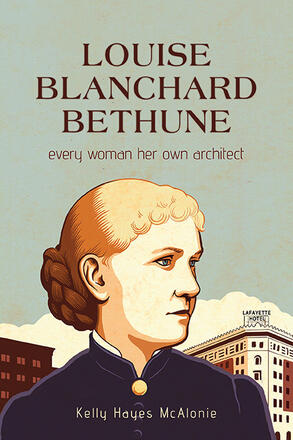
Louise Blanchard Bethune
Every Woman Her Own Architect
Alternative formats available from:
Open access edition available from:
The trailblazing story of the life and career of Louise Blanchard Bethune, America’s first professional woman architect.
Description
Winner of the 2023 Arline Custer Memorial Award presented by the Mid-Atlantic Regional Archives Conference
As America's first professional female architect, Louise Blanchard Bethune broke barriers in a male-dominated profession that was emerging as a vital force in a rapidly growing nation during the Gilded Age. Yet, Bethune herself is an enigma. Due to scant information about her life and her firm, Bethune, Bethune & Fuchs, scholars have struggled to provide a complete picture of this trailblazer. Using a newly discovered archival source of photographs, architectural drawings, and personal documents, Kelly Hayes McAlonie paints a picture of Bethune never before seen.
Born in 1856 in Waterloo and raised in Buffalo, New York, Bethune wanted to be an architect from childhood. In fulfilling her dream, she challenged the nation to reconsider what a woman could do. A bicycle-riding advocate for coeducation, Bethune believed in women's emancipation through equal pay for equal work. This belief would be tested during the design competition for the Woman's Building for the 1893 World's Columbian Exposition, where female entrants were not paid for their work. Bethune refused to participate on principle, but nonetheless her career thrived, culminating in the most important commission of her life, Buffalo's Hotel Lafayette. A comprehensive biography of the first professional woman architect in the United States, who was also the first woman to be admitted to the American Institute of Architects, this book serves as an important addition to New York and architectural history.
This book is freely available in an open access edition thanks to TOME (Toward an Open Monograph Ecosystem)—a collaboration of the Association of American Universities, the Association of University Presses, and the Association of Research Libraries—and the generous support of the State University of New York and the University at Buffalo Libraries. Learn more at the TOME website, available at: https://www.openmonographs.org/. It can also be found in the SUNY Open Access Repository at https://soar.suny.edu/handle/20.500.12648/8382.
Kelly Hayes McAlonie is Director of Campus Planning at the University at Buffalo, State University of New York.
Reviews
"…McAlonie presents a readable and well-researched study of the first woman to be recognized as a professional architect in the United States." — Nineteenth Century
"Kelly Hayes McAlonie has written a vital work of recovery to change the historical record about the life and career of Louise Blanchard Bethune. As the first professional woman architect in the United States and a trailblazer, Bethune believed women should have opportunities equal to men and developed pathways to pursue architecture for women who would follow. One of the most prominent and prolific architectural practices in Buffalo at the time, her firm profoundly shaped one of the largest and most industrial, wealthy, and progressive cities in the country. Although she encountered extreme sexism and misogyny during her career, her success speaks volumes about her tenacity and strength to persevere in a system where few women were present and remains an inspiration to us all." — Lori A. Brown, FAIA, School of Architecture, Syracuse University
"McAlonie has written a lively and much needed account of the first woman recognized as a professional architect in the United States. The book provides a well-researched overview of Louise Bethune’s personal and professional life, and discusses a range of projects from residences and schools to Bethune's best-known building, the Hotel Lafayette. But McAlonie's key contribution is placing Bethune firmly into the cultural milieu of the Gilded Age and the Progressive Era when women were challenging social norms and questioning their traditional roles. McAlonie allows us to see how this trailblazing designer helped shape New York's Western metropolis." — Gabrielle Esperdy, Interim Dean and Professor of Architecture, Hillier College of Architecture and Design, New Jersey Institute of Technology